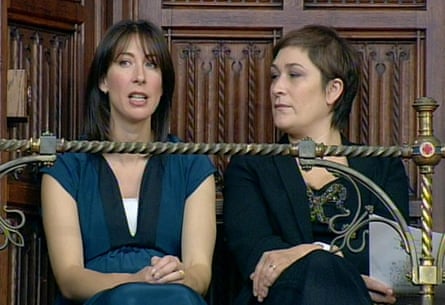Politics is awful.
If you want the digested read of Sarah Vine’s memoir on life as a Westminster WAG, that’s it: politics, she writes, is a hateful business that ruined her marriage to Michael Gove, her health and happiness. (Don’t ask what the Cameron years did to anyone else: this book is absolutely not about anyone else.) But like many a passionate hatred, this one started out as love.
In the book, Vine describes the “pinch me” moment early in the first Cameron government when she realised she’d made it; that the girl who never felt she fitted in, either growing up in Italy or at her English boarding school, is finally hanging with the cool kids. “Me, Sarah, the awkward inglesina, friends with the prime minister, being waited on hand and foot by staff at Chequers.”
If that makes you want to throw something, you probably won’t enjoy this tale of yearning for political paradise lost, AKA all the boozy nights “swimming in White Ladies” (David Cameron’s favourite cocktail) and hedonistic girls’ trips to Ibiza with her new best friend Sam Cameron which ended when Brexit blew their gilded circle apart. But if you’re less interested in politics than in how a grown woman could end up building so much of her self-esteem on a glittering friendship – well, buckle up for quite a ride.
Like the veteran Daily Mail columnist she is, Vine writes unsparingly and grippingly about some deeply intimate subjects: the childhood she says left her feeling worthless; the awful postnatal depression she endured when her children were tiny; the death threat to her husband delivered in an 18th birthday card sent to her daughter; the slow death of their marriage and the commendably civilised divorce they ultimately managed. Rather sportingly, she gives her ex-husband space to explain his version of events at critical points; more unsettlingly, she also interviews and quotes their only-just-adult children. If that seems somewhat lacking in boundaries – well, the Camerons’ inner circle was all about blurred lines.
The book opens the morning after the 2016 referendum, with the leave-supporting Gove-Vines queasily confronting victory. Although it’s a moment that changed the country, Vine’s focus is firmly on how it affected her social circle and particularly her once cherished but now broken friendship with Samantha Cameron, the scab she can’t stop picking.

The clue to why that lost friendship matters so much lies perhaps in her childhood. Her father, she writes, would tell her that she was an accident who would have been aborted if only it was legal; that she was too fat, a dud, a disappointment. Moving in exalted circles as an adult was a way of proving he was wrong. He didn’t even mention her in his father of the bride speech at her wedding, she says, but she could at least look at their A-list guests (including the young Camerons) and think ‘how far I had come that these were my actual friends’. But were they, really?
Although it’s politics she mostly blames for pushing her and Gove apart, the strain of trying to keep up with his richer Oxford mates seemingly didn’t help. (Readers who also found the austerity years hard going thanks to David Cameron, but for very different reasons and on considerably smaller salaries, may well struggle to sympathise.) The pressures of government further strain relations between the two couples, especially after Gove gets demoted in a reshuffle. Soon she’s starting to wonder whether Sam Cam sees her more as glorified staff, handy for helping with school runs, than a real friend.
When an angry David Cameron tells her she needs to rein in her husband over Brexit, she writes of feeling like a servant ordered about, sensing an “abyss of class” between them. Yet to the reader, it looks more like an abyss of understanding, a failure on her part to grasp how existential this referendum is for the Camerons and the country: even when Samantha lets rip at her over Brexit, she wonders why the fact that their kids grew up together isn’t trumping some stupid political disagreement, as if it were the political not the personal that was trivial at this point.
“There was a sense that my career and my husband’s didn’t matter as much as theirs,” she writes at one point, following friction over her taking a job at Sam’s bete noire, the Mail. “That we had to compromise our views and beliefs in order to facilitate their life at Number 10.” To which one can only say: which part of him being prime minister did you not understand? They say it’s lonely at the top. What this book proves is that it can be even lonelier on the way down.

 3 months ago
83
3 months ago
83

















































